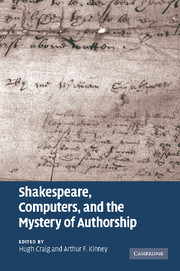Book contents
- Frontmatter
- Contents
- List of figures
- List of tables
- Notes on contributors
- Preface and acknowledgments
- 1 Introduction
- 2 Methods
- 3 The three parts of Henry VI
- 4 Authoring Arden of Faversham
- 5 Edmond Ironside and the question of Shakespearean authorship
- 6 The authorship of The Raigne of Edward the Third
- 7 The authorship of the Hand-D Addition to The Book of Sir Thomas More
- 8 The 1602 Additions to The Spanish Tragedy
- 9 Transforming King Lear
- Conclusion
- Appendix A Plays in the corpus
- Appendix B A list of 200 function words
- Glossary
- Index
- References
4 - Authoring Arden of Faversham
Published online by Cambridge University Press: 06 January 2010
- Frontmatter
- Contents
- List of figures
- List of tables
- Notes on contributors
- Preface and acknowledgments
- 1 Introduction
- 2 Methods
- 3 The three parts of Henry VI
- 4 Authoring Arden of Faversham
- 5 Edmond Ironside and the question of Shakespearean authorship
- 6 The authorship of The Raigne of Edward the Third
- 7 The authorship of the Hand-D Addition to The Book of Sir Thomas More
- 8 The 1602 Additions to The Spanish Tragedy
- 9 Transforming King Lear
- Conclusion
- Appendix A Plays in the corpus
- Appendix B A list of 200 function words
- Glossary
- Index
- References
Summary
‘You don't expect me to know what to say about a play when I don't know who the author is, do you?’ Flawner Bannal asks in Fanny's First Play by George Bernard Shaw; ‘If it's by a good author, it's a good play, naturally.’ For over four centuries now, the anonymous Arden of Faversham (c. 1588–92) has been thought an exceptionally good play by most critics, who date it sometime shortly after the 1587 edition of Holinshed's Chronicles and who acknowledge its influence on other plays at the dawn of the great decade of Elizabethan, and Shakespearean, drama. According to the logic of Flawner Bannal, it should therefore have an exceptionally good author – someone like Thomas Kyd or Christopher Marlowe, or perhaps even Shakespeare himself: a ready-made challenge for an application of computational stylistics.
The play dramatizes the bloody killing of Thomas Arden, a minor servant in the government of Henry VIII and Edward VI; a customs officer at the port of Faversham, Kent; and the recipient of the abbey lands of Faversham following the dissolution of the monasteries. He was killed by his wife Alice, her lover Mosby, and two hired assassins as he played backgammon in the parlour of his home.
- Type
- Chapter
- Information
- Shakespeare, Computers, and the Mystery of Authorship , pp. 78 - 99Publisher: Cambridge University PressPrint publication year: 2009
References
- 9
- Cited by



